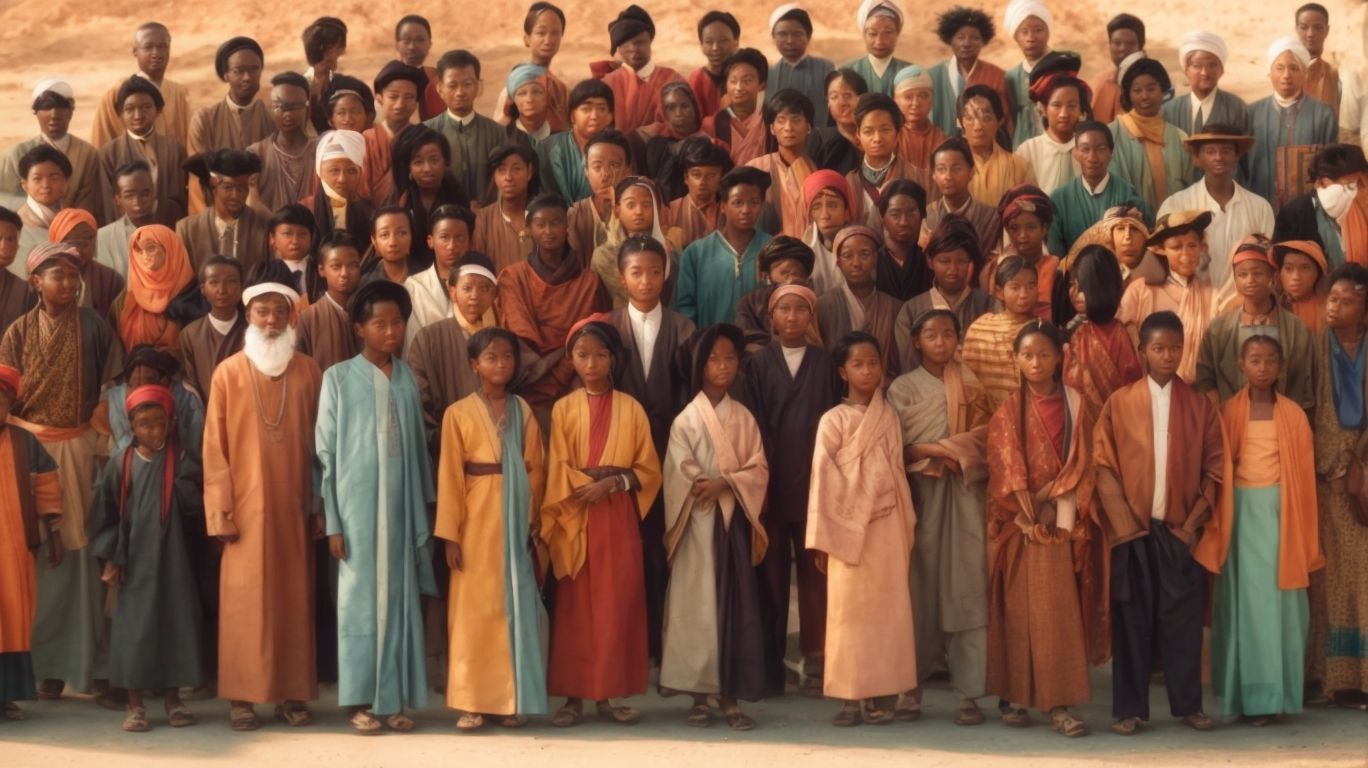Multicultural psychology plays a crucial role in promoting understanding, acceptance, and social justice. It enhances mental health treatment and encourages diversity within the field of psychology. Key concepts such as cultural competence, intersectionality, privilege, and oppression are integral to this discipline.
Embracing diversity in multicultural psychology involves challenging biases, educating ourselves about different cultures, advocating for social justice, and incorporating diversity in research and treatment. Let’s explore the significance of multicultural psychology and how we can embrace diversity within this field.
Contents
- 1 What Is Multicultural Psychology?
- 2 Why Is Multicultural Psychology Important?
- 3 What Are the Key Concepts of Multicultural Psychology?
- 4 How Can We Embrace Diversity in Multicultural Psychology?
- 5 Frequently Asked Questions
- 5.1 Why is multicultural psychology important?
- 5.2 What does embracing diversity mean in the context of multicultural psychology?
- 5.3 How does multicultural psychology benefit society?
- 5.4 How does multicultural psychology impact mental health?
- 5.5 What are the challenges of embracing diversity in multicultural psychology?
- 5.6 How can individuals promote multiculturalism and diversity in their daily lives?
What Is Multicultural Psychology?
Multicultural psychology is a specialized field within psychology that focuses on understanding the impact of cultural diversity on individuals’ behaviors, perceptions, and mental health.
It explores how cultural factors such as ethnicity, race, religion, language, and socioeconomic status shape clients’ experiences and influence their psychological well-being. Multicultural psychology delves into the complexities of cultural identities and their intersections, providing insights into how societal norms and historical oppressions impact mental health outcomes. This field emphasizes the importance of cultural competence in therapy and treatment, advocating for practitioners to consider clients’ diverse backgrounds to provide effective and inclusive care. By incorporating perspectives from various cultural frameworks, multicultural psychology encourages a more comprehensive understanding of human behavior and mental processes.
Why Is Multicultural Psychology Important?
Multicultural psychology is vital as it addresses the profound impact of race, ethnicity, and cultural aspects on therapeutic practices and mental health outcomes.
Research in multicultural psychology plays a crucial role in shedding light on the unique experiences and challenges faced by diverse minority groups in therapy. By examining how cultural norms, values, and beliefs influence individuals’ perceptions and behaviors, therapists can tailor their interventions to be more culturally sensitive and effective. Assessment tools specific to different cultural backgrounds help clinicians gain a deeper understanding of clients’ identities, allowing for a more comprehensive and inclusive approach to treatment.
Promotes Understanding and Acceptance
Fostering understanding and acceptance is a core goal of multicultural psychology, encouraging individuals to embrace and respect diverse ethnic identities within the societal framework.
Multicultural psychology plays a crucial role in shedding light on how cultural influences shape our perceptions, behaviors, and interactions with others. By examining various cultural norms, practices, and beliefs, individuals can develop a deeper sense of cultural competency and sensitivity towards people from different backgrounds.
This field emphasizes the importance of empathy and open-mindedness, urging individuals to challenge stereotypes and prejudices that may hinder the acceptance of diverse cultural identities. Through research and education, multicultural psychology seeks to create a more inclusive society that celebrates the richness of human diversity.
Addresses Social Justice Issues
Multicultural psychology plays a crucial role in addressing social justice issues by examining and challenging the impact of historical oppressions and societal norms on mental health and well-being.
It delves into the complexities of how ethnicity, cultural beliefs, and social factors interplay to shape individuals’ experiences and identities in a diverse society. This branch of psychology acknowledges the significance of considering these multifaceted influences when understanding human behavior and well-being.
Enhances Mental Health Treatment
Multicultural psychology enhances mental health treatment by acknowledging the impact of childhood experiences, cultural identities, and worldviews on individuals’ therapeutic needs.
Counseling approaches within multicultural psychology take into account the diverse backgrounds and beliefs individuals bring to therapy sessions, facilitating a more personalized and effective treatment plan. Therapists who possess cultural competence can better understand and address the unique challenges and strengths that arise from different cultural contexts, fostering a deeper therapeutic alliance. By integrating cultural perspectives into therapy, mental health professionals can create a safe and inclusive space that honors each client’s identity and values, ultimately leading to more successful outcomes in treatment.
Encourages Diversity in the Field of Psychology
Multicultural psychology encourages diversity within the psychology field by advocating for inclusive training programs and a diverse counseling workforce.
It highlights the significance of cultural competency in understanding and respecting the unique beliefs and values of individuals from various backgrounds. By incorporating ethical practices and promoting sensitivity to diverse perspectives, multicultural psychology aims to create an environment that fosters mutual respect and understanding.
It underscores the importance of cultivating a strong therapeutic alliance between counselors and clients, sculpted on respect, trust, and empathy. This alliance becomes stronger when counselors acknowledge and embrace the diverse cultural backgrounds of their clients, leading to more effective and culturally sensitive counseling outcomes.
What Are the Key Concepts of Multicultural Psychology?
Multicultural psychology encompasses essential concepts such as cultural competence, intersectionality, and the dynamics of privilege and oppression in understanding diverse clients’ experiences.
Cultural competence refers to the ability to effectively work with individuals from different cultural backgrounds and understand how their behaviors, perceptions, and norms may be influenced by their cultural heritage. It involves being aware of one’s own cultural biases and continuously learning about and respecting other cultures.
- Intersectionality explores the interconnected nature of social categorizations such as race, gender, and ethnicity, and how they overlap to shape individuals’ experiences.
- The dynamics of privilege and oppression delve into power dynamics in society, highlighting how certain groups benefit from systemic advantages while others are marginalized and face obstacles based on their social identities.
Cultural Competence
Cultural competence, as proposed by scholars like Corey and Sue, highlights the importance of understanding and respecting diverse cultural backgrounds in therapeutic practices.
This concept recognizes that individuals seeking counseling may come from various cultural backgrounds, each influencing their beliefs, values, and perspectives. By embracing cultural competence, counselors can create a more inclusive and responsive environment that caters to the unique needs of every client. Research indicates that incorporating cultural competence in counseling leads to more effective and meaningful therapeutic outcomes, fostering greater trust and connection between counselors and clients.
In today’s increasingly interconnected society, cultural competence is not just a desired skill but a necessity for mental health professionals. It enables counselors to navigate the complexities of diverse client populations with sensitivity and empathy, ultimately promoting positive change and growth.
Intersectionality
Intersectionality in multicultural psychology emphasizes the interconnected nature of factors such as ethnicity and diversity, leading to a comprehensive understanding of individuals’ experiences.
By acknowledging that individuals possess multiple, overlapping identities that intersect in unique ways, multicultural psychology, rooted in the notion of cultural diversity, recognizes the nuanced interactions between various dimensions of identity.
This approach calls for therapists to consider how systemic inequalities and societal structures impact an individual’s mental health and well-being. Understanding the complexities of intersectionality assists in tailoring therapy interventions that are sensitive to the diverse needs and backgrounds of clients, ultimately fostering a more inclusive and effective therapeutic environment.
Privilege and Oppression
The examination of privilege and oppression within multicultural psychology sheds light on how societal norms and ethnic factors impact individuals’ mental health and behaviors.
Understanding the complex interplay between privilege and oppression is crucial in the assessment and treatment of individuals from diverse backgrounds. Research indicates that individuals who experience systemic oppression may exhibit unique patterns of behaviors and coping mechanisms influenced by their social environments.
In therapy, acknowledging these dynamics and forming a strong therapeutic alliance based on empathy and cultural competence can significantly improve treatment outcomes. By addressing issues of power and discrimination, mental health professionals can create a more inclusive and affirming environment for clients of all backgrounds.
Acculturation and Assimilation
The processes of acculturation and assimilation in multicultural psychology examine how individuals navigate their cultural identities within society and therapeutic settings.
Acculturation refers to the process by which individuals adapt to a new culture by incorporating its norms and values into their own cultural identity.
On the other hand, assimilation involves fully integrating into the dominant culture, often resulting in a loss of one’s original cultural identity.
These concepts play a crucial role in understanding how individuals interact with society and the impact of such interactions on their mental health. In therapy, counselors must consider the complexities of cultural identities and the dynamics of acculturation and assimilation to provide effective support.
How Can We Embrace Diversity in Multicultural Psychology?
Embracing diversity in multicultural psychology involves challenging biases, educating oneself about different cultures, advocating for social justice, and incorporating diversity into research and treatment practices.
In promoting diversity within multicultural psychology, it is crucial to implement training programs that emphasize understanding and respecting minority groups‘ experiences and perspectives. These training initiatives can help professionals develop cultural competence and enhance their ability to work effectively with individuals from various backgrounds.
Fostering an environment that encourages open discussions about different cultural beliefs and values can lead to a more inclusive and welcoming atmosphere within the field. By integrating these strategies, multicultural psychology can evolve to better address the diverse needs of individuals seeking mental health services.
Acknowledge and Challenge Our Own Biases
Acknowledging and challenging personal biases is a critical step in embracing diversity within multicultural psychology, fostering a more inclusive and culturally sensitive approach.
By recognizing and interrogating personal biases, psychologists can cultivate cultural humility, acknowledging the limitations of their own perspectives and appreciating the unique experiences of individuals from different backgrounds.
Through self-reflection, professionals in the field can identify unconscious biases that may impact their clinical judgments and interactions with clients, paving the way for more authentic and effective therapeutic relationships.
Furthermore, openness to diverse perceptions, practices, and beliefs allows psychologists to adapt their therapeutic techniques to align with the values and worldviews of their clients, promoting a more collaborative and respectful therapeutic environment.
Educate Ourselves about Different Cultures
Educating ourselves about different cultures is essential for enhancing cultural competence and understanding diverse norms, behaviors, and societal influences within multicultural psychology.
By immersing oneself in various cultural backgrounds, individuals can develop a deeper appreciation for the complexities that shape human behavior and interaction.
Cultural education provides a foundation for fostering empathy, tolerance, and respect towards individuals from different cultural backgrounds. Continuous learning and cross-cultural training are imperative in navigating the dynamics of diverse populations and promoting inclusivity in psychological practice.
Advocate for Social Justice and Equality
Advocating for social justice and equality in multicultural psychology involves addressing disparities influenced by social and cultural factors to improve health outcomes and therapy effectiveness.
Incorporating social justice advocacy into psychological practice is crucial for understanding the multifaceted impact of societal systems on individuals’ well-being. By recognizing the ways in which diversity, oppression, and privilege intersect, therapists can tailor interventions to meet the specific needs of diverse populations.
Equality promotion within therapy ensures that all clients receive fair treatment and opportunities for growth, regardless of their background. Fostering a culturally inclusive environment not only enhances therapeutic alliance but also facilitates a deeper understanding of clients’ experiences and identities.
Incorporate Diversity in Research and Treatment
Incorporating diversity into research and treatment methodologies within multicultural psychology enhances the relevance and effectiveness of therapeutic approaches, considering individuals’ ethnicities, worldviews, and counseling needs.
By weaving diverse perspectives into the fabric of psychology research and therapeutic practices, professionals acknowledge the intricacies and nuances that stem from various cultural contexts. This integrative approach enables psychologists to tailor treatment plans that align with clients’ cultural backgrounds and belief systems, fostering a deeper sense of trust and rapport. Through this inclusive lens, therapists can offer more personalized interventions that resonate with the unique experiences and values of each individual, ultimately leading to more positive outcomes and promoting a greater sense of cultural humility in the field of psychology.
Frequently Asked Questions
Why is multicultural psychology important?
Multicultural psychology is important because it helps individuals understand and appreciate the diversity in society. This field of psychology examines how cultural backgrounds and experiences shape individuals’ thoughts, behaviors, and emotions. By embracing diversity, multicultural psychology promotes inclusivity and understanding among different groups.
What does embracing diversity mean in the context of multicultural psychology?
Embracing diversity in multicultural psychology means acknowledging and valuing individual differences based on race, ethnicity, gender, sexual orientation, religion, and other cultural identities. It involves recognizing the unique perspectives and experiences of diverse groups and promoting equality and inclusivity.
How does multicultural psychology benefit society?
Multicultural psychology benefits society by promoting acceptance and understanding of different cultures, which leads to a more harmonious and inclusive community. It also helps reduce discrimination and promotes social justice for marginalized groups. Additionally, multicultural psychology can inform policies and practices that are more inclusive and sensitive to diverse populations.
How does multicultural psychology impact mental health?
Multicultural psychology plays a crucial role in understanding and addressing mental health issues in diverse populations. It recognizes that cultural backgrounds and experiences can significantly influence an individual’s mental health and well-being. By embracing diversity, this field of psychology can help individuals from different cultures receive appropriate and effective mental health treatment.
What are the challenges of embracing diversity in multicultural psychology?
One of the challenges of embracing diversity in multicultural psychology is addressing one’s own biases and prejudices. It can also be challenging to navigate and understand the complexities of different cultures and ensure cultural sensitivity in research and practice. Additionally, there may be resistance or lack of resources and support for multicultural approaches in the field.
How can individuals promote multiculturalism and diversity in their daily lives?
Individuals can promote multiculturalism and diversity in their daily lives by actively seeking to learn about different cultures, challenging stereotypes and biases, and engaging in respectful and open communication with individuals from diverse backgrounds. Supporting and advocating for inclusive policies and practices can also contribute to promoting diversity in society.



